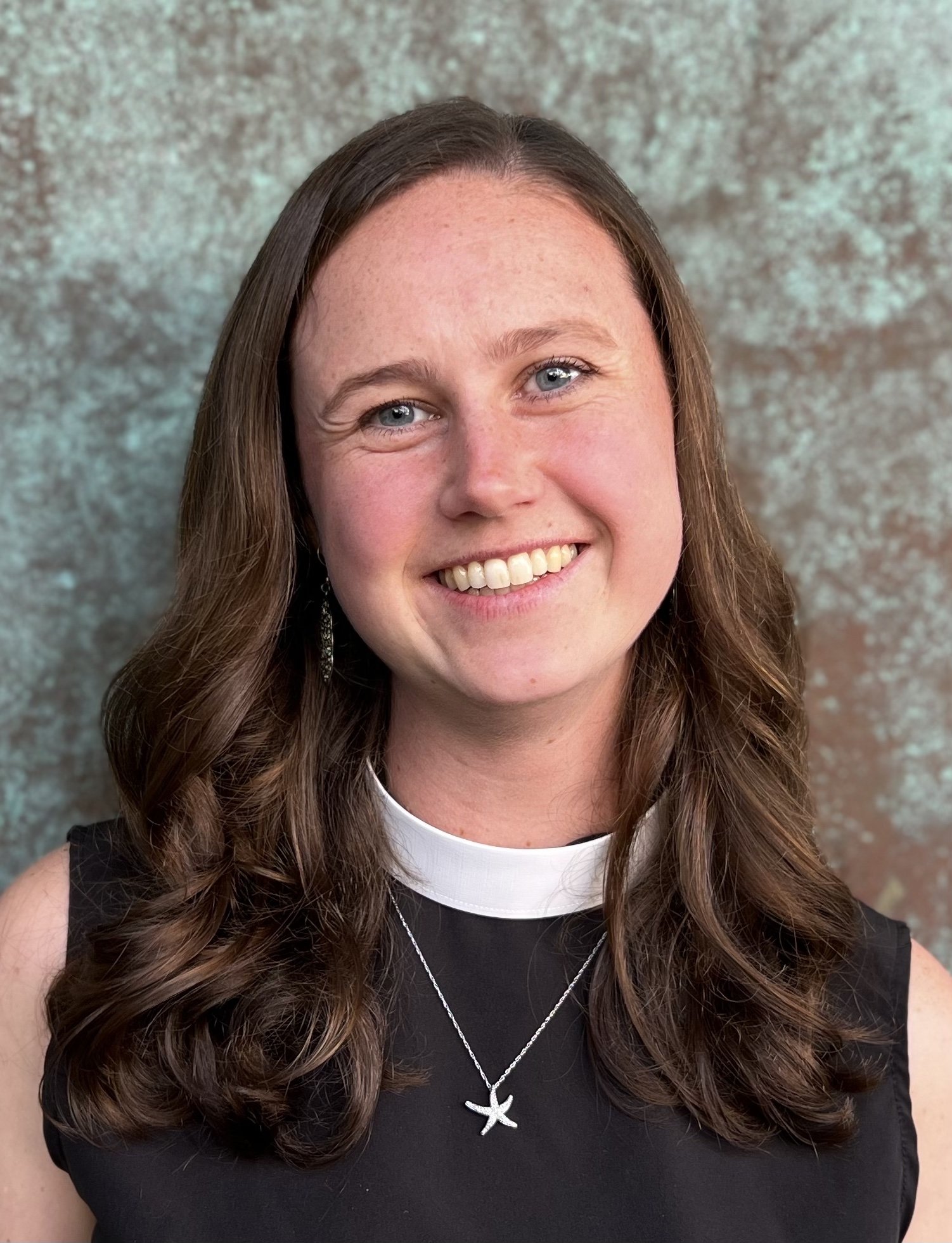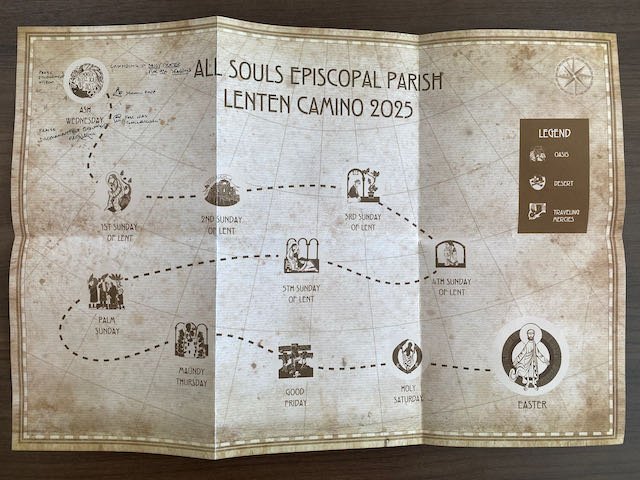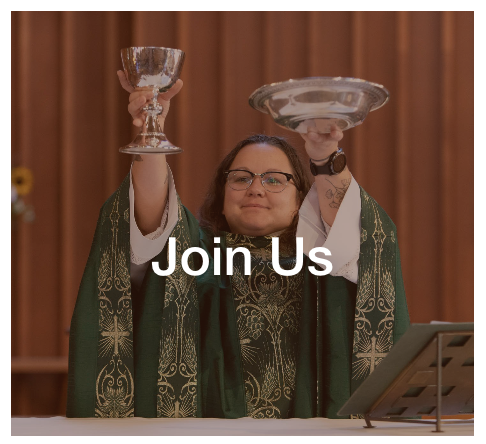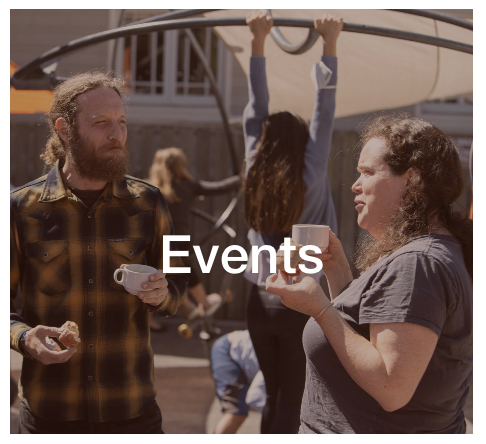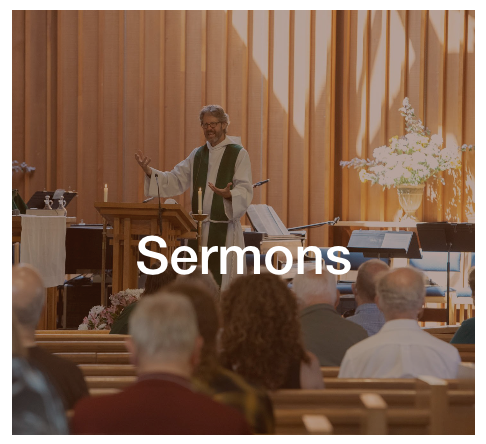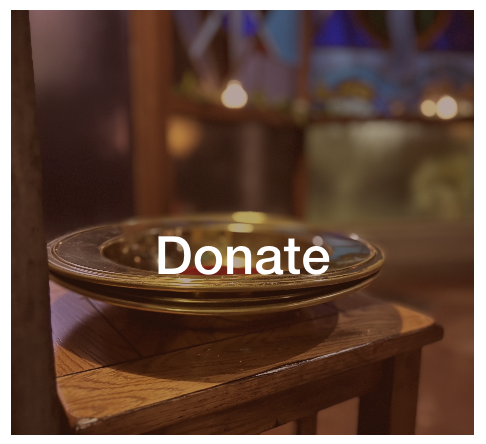The Pathfinder: March 27th, 2025
What Does A Sermon Do?
Sometimes, late on a Sunday evening, I go to the nave and sit alone in the empty pews. The church is hushed, peaceful. No music, no voices, no shuffling of bulletins, no children playing in the soft spaces. Yet despite the quiet and solitude, the space feels full.
I can still feel the energy of the people who gathered earlier that morning. I can almost hear the echoes of the prayers we said, the hymns we sang.
And it strikes me: in worship, we come and we go, moving our bodies through space, saying new words and repeating very old ones… and all of it is fleeting and irreplicable. Never again will this particular combination of people gather on this particular day to celebrate or mourn or pray for whatever we happen to be carrying. We repeat the same rituals across weeks and years and centuries, yes, but each iteration is utterly unique. That’s part of the value, and the point, of what we do here in church.
In science – the world I belonged to before I became a priest – the gold standard of an experiment is replicability. We know that something is “true” if we can repeat the same steps, under the same conditions, over and over and get the same results. (Of course, perfect replicability– controlling for every variable– is impossible, but we try!) Worship feels different. What we feel and experience in each liturgy is impossible to exactly reproduce or copy. Because what we pursue here isn’t simply knowledge, but transformation. The truth we seek is subjective, personal, and relational. We ask (usually subconsciously), How will this liturgy move me? What will I feel? How might I be changed? The answers are never the same from week to week or person to person. They’re dynamic and contextual and complex.
Lately, I’ve been thinking about this fleetingness and particularity in relation to preaching. I’ve always been fascinated by sermons. Hearing them in church, as a young child, is part of what first made me interested in becoming a priest. I love the idea that a sermon is a medium of translation and connection across time and space. Beneath every Scriptural text is an important question or idea that once animated a writer or a community. The role of the preacher is to discover that question, and to help it come alive for us today.
And the conversation runs in two directions: past to present, and present to past. Our own lived experiences– our contemporary questions, concerns, and dilemmas– help give life and meaning to the text itself. Paul Tillich writes that in the modern day, words like “sin” and “grace” and “redemption” (and many more) have lost their original meaning. They’ve been diluted and distorted over centuries of overuse or misuse. "But there is a way of rediscovering their meaning,” Tillich writes. “The same way that leads us down into the depth of our human existence. In that depth these words were conceived; and there they gained power for all ages; there they must be found again by each generation, and by each of us for himself.” For me, one of the most valuable things a sermon can do is invite us and guide us to these deeper levels of our own being. There, we might discover in ourselves the truths from which and about which our Scriptures speak. (This idea is from one of Tillich’s own sermons, “You Are Accepted,” which I’d highly recommend).
Recently, I came across some other words that helped me capture what feels special about sermons. In an article called “Hearing Homilies,” in Commonweal magazine (Sept. 2024), Paul Griffiths writes, “A homily is an oral artifact. It exists as a homily only for the time it takes to be spoken in the mass to which it belongs.” (A homily is another word – often used in the Catholic church– for a sermon). What he means is that the meaning of a sermon is more than the sum of the words or ideas that compose it. The entity we’d call a “sermon” (or a homily) consists of language, yes. But it also interacts with the sights and sounds and movements and feelings of the liturgy as a whole. It belongs in a particular, embodied, communal moment – in the case of our tradition, it belongs in the moment directly after the Gospel text is read. You can read or listen to the sermon later, and that can be very meaningful and moving. But that will be its own kind of moment. It will never be quite the same as when the words were first spoken aloud directly to a body of people gathered in sacred space.
Griffiths goes on to describe the difference, in his view, between reading a sermon after the fact and receiving it in person. When we hear a sermon in real-time, the words have a “performative” quality. They do something to the listener. From Griffiths: “You can overhear someone say ‘I forgive you,’ but you don’t receive that forgiveness. You would not have received the full force, or effect, of those words. What those words do wasn’t done to you.”
I forgive you, I promise you, I am with you… these are words that we must hear spoken to us, not simply around us, in order to be transformed by them. And a sermon, for Griffiths, is like that. A sermon is the way that Christ’s words can be spoken to us: personally, intimately, animatedly, and as directly as possible in our time. “Even if you don’t understand the language of a homily, Jesus still does what he always does with words, which is to show himself as fully as hearers are able to receive him,” he writes. The point of a sermon, then, isn’t to teach you something. The point is to move you, to touch you, and– perhaps– to change you. To change all of us.
I don’t mean to discount the value of listening to a sermon later, or reading it, or watching it on livestream. There are many meaningful ways to participate in worship and to engage deeply with the words that are said. What I do appreciate, though, is this idea that a sermon is relational and participatory. It matters that you and me– in all of our particularity and selfhood– receive the words of a sermon. In doing so, we become part of what makes that sermon what it is. And we become part of something that will never quite exist, in all of its fullness and dimension, again.
I’ll be thinking about all this as we head into Holy Week and Easter. Holy Week is the time of the year when many of us lean most fully into liturgy– when we show up at church at all hours to do things like feast together, wash each other’s week, wave palms, strip the nave of decorations, parade around the block chanting a litany, and many more strange, sensorily-rich, sacred rituals. As we do, I invite you to reflect on the way that words take their place amid ritual actions. I invite you to think about the creative interplay between what is irreplicable and repeated, lasting and fleeting, ancient and new– and where you belong within all of it. Because we all– each of us– belong.
Peace,
–Emily B+
Daily Prayer on the Camino
On Wednesday afternoon March 19, the unthinkable happened: my cell phone broke. After a mere six weeks my shiny, new, supposedly top-of-the-line Pixel model wouldn’t turn on. It wasn’t low on juice, it just wouldn’t…turn…on.
Frank graciously promised he would take it to the Verizon store the following day, but meanwhile, horrors, I was without my phone.
It was sobering to realize how reliant I had become on this one gadget. I had developed a simple morning routine centered around it, starting with checking the time when I first woke up; then, sometime after 5:30, scanning my email and reading the New York Times. Well, that was NOT going to happen on Thursday morning.
At some point in the late afternoon, while I was bitterly complaining, Frank gently suggested that instead, I could use the small stand-alone tablet we had recently purchased. It easily fit on my nightstand, and I could certainly check the time during the night and early morning. I knew he had added tabs for the NY Times, Washington Post, Guardian, etc., to the device, so it appeared that I could safely continue my morning routine without my phone: I was delighted to have a good work-around until my phone was repaired.
A few hours later we were at our Camino group, hosted by Ann and Charlie Myers. We were discussing our news consumption during these challenging days, and Phil mentioned that he prays Morning Prayer before he reads the NY Times. “Ah,” I burst out - the lightbulb had gone off in my mind - I could pray before I read the NY Times: This would be an excellent Lenten practice, I thought, half-aloud. On discussing this later with Frank, I discovered that he already had a tab for Forward Movement’s Daily Office set up on our tablet.
The following morning I reached for the tablet and it opened to Morning Prayer. As I began reading the prayers, hearing the gentle cadences in my mind, praying the Psalm of the day, reading the Scriptures, I could feel my bodily tension ease, my breathing slow, my mind open, and my heart rise. It was easy to take my time and savor the words - even those that reminded me of my shortcomings – because in so many of the verses I felt God’s love and compassion shining through.
I did read the NY Times after I finished Morning Prayer, but my mind was so much clearer and more relaxed, that the news did not upset me nearly as much as it had earlier in the week. Morning Prayer has become the first thing I read when I am finished sleeping, and it seems to keep me calmer during the day.
It took several days before my phone was repaired (“a software glitch” was the diagnosis from the repair store’s very competent technician) but in those few days, my new Lenten practice of reaching for the tablet and praying has become a sweet, early morning habit. Many thanks to my fellow travelers on our Camino this Lent.
From “The Song of Zechariah”:
In the tender compassion of our God*
The dawn from on high shall break upon us,
To shine on those who dwell in darkness and the shadow of death,*
And to guide our feet into the way of peace.
-Kathleen Summerland Heuser
Bearing Faithful Witness
If you're like me you have whiplash from sudden changes impacting our communities and democracy. Many are living in fear.
community, government and non-profit workers laid off, groups defunded, gutted
environmental regulations and labor protections rolled back
immigrants, visa-holders and others deported/excluded
racial justice rolled back, voting rights restricted
decreasing care for elders, people with disabilities, veterans and children with special needs
schools and universities losing jobs, colleagues, students, and projects
The All Souls Justice & Peace committee met Tuesday to begin to discuss how we can resist and repair the new breaches that are being torn in our community.
We invite everyone to help bear Faithful Witness to the needs of our community and the world. As a first step we’ll be gathering on Saturday, April 5 at Oscar Grant Plaza (409 14th St. Oakland, CA 94612) to join one of hundreds of such gatherings across the country. We’ll meet at 12:45 pm at the southeast corner of Broadway & 14th and walk together to the plaza.Together we can demonstrate our resolve to hold fast to our commitment to feed the hungry, heal the sick, welcome the stranger. (NOTE: there will be simultaneous gatherings across the country. Connect with Jane Vandenburgh if you’re going to Sacramento or Jenny Kern if you’re headed for the North Berkeley BART Plaza gathering.)
See one of us for more info. We’ll be making signs after the 10:30 service Sunday in the Common Room and talking more about how we can build and hold a beloved community in this time of crisis.
Gretchen Donart, Beth Christensen, Christine Trost, Jennifer Akiyama, Janet Chisholm, Raymond Yee, Emily McDonald, Elena Ramirez, Margaret Sparks
–Gretchen Donart on behalf of the J&P Committee
March Vestry Update
On March 19, the Vestry met for our first ordinary meeting of 2025 and we had much to discuss! As co-chaplain, I invited members to reflect on the lasting effects of work done in love, asking: even when the tangible signs of our current efforts eventually pass away, as all things must, what do we hope will linger as our spiritual legacy?
After Phil+ provided an orientation to the parish’s financial oversight mechanisms, Michael Lewis, our Senior Warden, walked us through December and January budget balance reports for both parish operations and the Living Waters campaign. We learned from the Treasurer’s Report that pledge income given during January exceeded what was expected although plate offerings were somewhat lower. Phil+ reminded us that trends in congregational giving tend to ebb and flow so we can expect higher-than-expected seasons of giving to be followed by lower-than-expected seasons and we should plan accordingly.
Michael led us in reviewing and approving the Vestry Goals for 2025. After reflection and discussion at our January retreat, we decided to recommit to 2024’s goals to give them time to bear fruit before adding any major new initiatives or changing directions. These goals fall under three categories: Living Waters, which includes the Isaiah Project; Welcome; and Kinship. We agreed on who would be responsible for each of the goals in the coming months, confirming Cathy Goshorn and Joe Garrett as Vestry points of contact with the Welcome Committee and Erin Horne and myself as liaisons to the Kinship committee. Our aim will be to create more pathways from Welcome to Kinship by creating opportunities for new and current All Soulsians—especially young families, young adults, and those who feel isolated—to cultivate and deepen their connections with one another.
Michael then led us in a brief discussion about the Sunday service schedule to make sure that the current schedule is addressing the congregation’s needs as well as it can. We observed that since COVID, established patterns have been disrupted and many people are still finding their new normal, and so we decided that now is not the time to make major changes. We agreed to revisit this conversation periodically so that we can discern when the time is ripe to make a change, committing to do so only with extensive input and deliberation with the congregation.
Tim Erenetta presented the new employee handbook to the Vestry, which has been updated to account for changes in laws and work practices since the last update in 2017. Some updates include changes to reflect Family Medical Leave Act and California law changes, clarifying lines of reporting, and policies around workplace violence.
Phil Brochard reported to the Vestry about changes in the Isaiah Project, as the Parish transitions to working alongside grantee organizations, and how specific All Soulsians were heading up the partnerships with the organizations, including: Center for Art Esteem (Lewis Maldonado); American Indian Child Resource Center (Christine Trost); Elizabeth House (Nathan Brostrom); and YSA Tiny Home Village (Toni Martinez-Borgfeldt).
Phil+ and Cathy Goshorn updated us on the call for a new Associate for Welcome and Kinship, including progress in collecting applications. The application closes March 21, and the committee is looking to prepare a short-list of candidates for Phil+’s approval in early April.
Phil+ shared that Emily Hansen Curran’s church plant, St Lucy’s, has been making progress on gaining official approval by the Diocese of California, with the support of All Souls. The new congregation will be meeting at St Paul’s in Oakland, with a soft launch in May and a full weekly service launch in August. Emily Hansen Curran’s last day at All Souls will be April 27 and we plan to give her a warm send-off.
Phil+ shared that All Souls had been invited to apply for the Lilly Endowment’s National Storytelling Initiative on Christian Life under the category of Colleges and Congregations in the West. The Parish will apply for up to $50,000 as an initial grant and up to $5 million for a subsequent round of grants in partnership with scholars at Willamette University and a photographer/multimedia artist in Minnesota.
Grace Telcs gave an update on the Living Waters project, which is currently discerning how to use extra funds that are available due to below-budget PG&E costs and investment income from early giving by the congregation.
Looking forward, the Parish hopes for the Parish Hall to be ready for Easter. The heater is coming just in time for the end of winter, the elevator shaft is being sheetrocked, and the stove has arrived but is not powered yet. The seismic report has arrived and has been shared with WCI to get a rough quote.
Finally, Matt Wolka shared an opportunity that has come to the Parish to acquire an organ through Hupalo and Repasky, our organ maintainers, at a discounted price of $150,000. The Vestry discussed the opportunity costs of purchasing or not purchasing another organ at this time and what opportunities it would unlock, from significantly expanding our musical repertoire during church services to potential future revenue from organ lessons, practices, and performances. This is a rare opportunity to address long-needed updates to the organ.
We ended with a closing prayer during which we offered up our hopes and our gratitude for the collective efforts of all involved.
–Sarah Bakker Kellogg
Heating pipes: equipment or devices used to provide heat, especially to a building.
Are you tired of leaving your coat and hat on during Sunday services? Take heart, this will soon change! As the accompanying pictures show, many, many pipes connecting a heating system have been installed in the boiler room in preparation for heat to warm us up! The goal is Easter Sunday but it could be earlier. Stay tuned, those coats may be able to be put away!
Although we are turning rooms over for use, work is still in progress! If you have questions or concerns about what you see, please contact Ann Myers @ annclairemyers@gmail.com for clarification.
Egress continues through both Narthex doors and out the nave to the Jordan Courtyard. Remember to bundle up when the temperatures are expected to drop!
Top Left: Boiler room with air handler Top Right: Ongoing connections to boiler
Bottom Left: Piping connecting the hot water loop for heating Bottom Right: Hot water loop
–Ann Myers and the Property Committee
Announcements & Events
Happening This Week
TONIGHT (THURSDAY)
6:30 PM, BIB Film Screening of “Same God” in Jordan Court Community Room.
SUNDAY
7:00 AM, Reading Between the Lines Bible Study, either in person in the Common Room or Click here to join by Zoom.
8:00 AM, Holy Eucharist in the Chapel. Please access the Chapel through the copper doors on Cedar St.
9:15 PM, Adult Formation in the Parish Hall.
10:30 AM, Sung Eucharist in the Nave. Join us via livestream here. Sunday School in the classroom downstairs.
WEDNESDAY
9:00 AM, Eucharist in the Jordan Court Community Room.
Learn with Us
ADULT FORMATION
The Death of the Messiah
Join the Rev. Michael Lemaire this Sunday, March 30th, for the final class in this series looking at the various accounts of the Passion and Death of Jesus in the four gospels. We will explore what is known about the history and origin of the story and explore the different ways each gospel writer shapes the narrative. Classes will be held in the Parish Hall on the following Sundays: 3/9, 3/16, 3/23, and 3/30.
Holy Week Introduction - April 6th
The Revs. Phil and Emily B. will lead us in a Q&A style class on the origins, meanings, and practices of Holy Week leading up to Easter Sunday. All are welcome to join in this informational session about Holy Week on April 6th at 9:15a in the Parish Hall.
Gather with Us
Save the Date! Maundy Thursday Agape Meal on April 17th
In this spirit, we will eat together for a Maundy Thursday Agape Meal––an ancient practice in the Christian church, recalling the meals Jesus shared with disciples during his ministry, and especially at the Last Supper before his crucifixion, and expressing the koinonia (community, sharing, fellowship) of the followers of Christ. The term agape comes from the Greek––a term for love in its broadest sense. The Agape Meal is another way of living out Jesus’ mandatum (Latin for “commandment,” as in Maundy Thursday) or commandment that we love one another with the same self-emptying love, mercy and forgiveness with which he has loved and still loves us.
As part of this service we will pray, sing a few songs, have some conversation, and we'll eat a light meal together. Our intention is for this to be a kid-friendly service, which you can attend as a stand-alone service on Maundy Thursday, or as preparation for the 7:30p Eucharistic service with foot washing. If you are able, please RSVP for this meal so that we know about how much food to bring. Click here to RSVP
Worship with Us
CHILDREN & FAMILY
Sunday School (for kids pre-K through 5th grade) happens every week during the 10:30 service. Starting March 16th, we’re trying out a new way to begin our time together! Children will begin the service in the nave with their families (rather than going straight down to the classroom before the service). They’ll stay through the opening hymn and procession. Then, during the “Song of Praise” (about 5 min into the service), the kids will see a teacher holding a big wooden cross coming down the aisle. They’ll “follow the leader” as a group downstairs to the classroom. We hope that this change will help kids feel more involved with the congregation at the start of the service, and it will create an intentional transition into the start of class. Children will still return to church at the “Peace.”
Come join other All Soulsian families and kids in the courtyard after church. Please be mindful of fencing around the perimeter.
To sign up for our Children and Family newsletter, please email Emily B.
For Both Kids and Youth: Summer Camps!
It’s that time of year… time to sign up for camp! Kids and youth from All Souls have loved attending camp in two places: Bishop’s Ranch (the same place we have Parish Retreat, near Healdsburg), and St. Dorothy’s Rest. Both have roots in the Episcopal tradition and have programs for all ages (and some for families, too). You can find more information about St. Dorothy’s here, and Bishop’s Ranch here.
For children: It can be especially fun to go to camp at the same time as other kids from church! If you’re interested in coordinating dates, please reach out to Brenna Hall, an All Souls parent (brenna.k.hall@gmail.com).
YOUTH PROGRAM
Youth Group (for grades 6-12) happens on Sundays from 7-8:30pm. Generally, we alternate between an all-grades gathering, and a high school small group (~once a month).
This Sunday (March 30th) there will be no Youth Group because of Spring Break.
Coming up:
April 6th: All Grades Youth Group
April 13th: High School Small Group
April 20th: No Youth Group - Happy Easter!
April 27th: Pilgrimage to Grace Cathedral 12-6pm
Download our Spring (March/April) 2025 calendar here. To join the weekly youth mailing list, email emilyb@allsoulsparish.org.
HOLY WEEK SCHEDULE
4/17 6-7:15PM - Agape Meal
4/17 7:30PM-9PM - Maundy Thursday Service
4/17-4/18 9PM-9AM - Overnight Prayer Vigil
4/18 12N-3PM - Three Hour Service
4/18 4PM - Holy Week for Children
4/18 7:30PM-9PM - Good Friday Service
4/19 9:30AM-10AM - Holy Saturday Service
4/19 8PM-11PM - Easter Vigil
4/20 9AM-10:30AM - Easter Sunday
4/20 11:15-12:30PM - Easter Sunday with Baptisms
Justice & Peace
BUILDING INTERFAITH BRIDGES invites you to TWO UPCOMING EVENTS:
MARCH 27th - Join us for a movie night TONIGHT, Thursday, 3/27, in the Jordan Court Community Room, showing "Same God," a documentary featuring Dr. Larycia Hawkins - a black, female professor at a prominent Christian college who wore a hijab in solidarity with Muslims and said that Christians and Muslims worship the Same God. The firestorm that followed exposed the rifts among evangelicals over race, Islam, religious freedom and politics. The evening will follow this schedule:
6:30pm: Gather and snack
7:00pm: Movie
8:35pm: (optional) Small group reflection and discussion
9:00pm: Adjourn
For questions, please contact Paul Mathew or Bonnie Bishop.
APRIL 13th - Please join Building Interfaith Bridges for a Passover Seder at Congregation Beth El on Sunday, 4/13th @ 5p. Register here today! (Please note: registration closes on April 3, 2025)
Led by Rabbi Ira and Cantor Elaya, friends from the Building Interfaith Bridges partnership are invited to enjoy a festive and musical Passover celebration and a delicious kosher-for-Passover meal. The seder will include singing from our Beth El Chorus and will be accessible and meaningful for participants of all ages! Let all who are hungry come and eat! There is no Zoom option for the seder - we look forward to celebrating with you in person at Beth El! Event Details:
Day/Date/Time: Sunday April 13 @ 5p
Location: Congregation Beth El, 1301 Oxford St.
Cost: $54/person
RSVP here: https://www.bethelberkeley.org/event/second-night-congregational-seder2.html
APRIL 9th - The Diocese of California welcomes Bishop Mariann Budde to the Bay Area
Bishop Mariann Edgar Budde to Deliver Inaugural Robert N. Bellah Lecture
Wednesday, April 9 | 5:00 p.m. - 6:30 p.m. | First Presbyterian Church of Berkeley
The title of Budde’s address is: Following Our North Star in Tumultuous Times.
This special event is co-sponsored and supported by the Graduate Theological Union, the family of Robert N. Bellah, the Bellah Legacy Group, the UC Berkeley Center for the Study of Religion and the Henry Luce Foundation, Grace Cathedral, and an anonymous donor. UPDATE: The event if full so if you’d like to participate, then the livestream option is open to everyone.
Get tickets here | Learn more
APRIL 9th - From Remembrance to Healing: Learning from the Holocaust and the Tulsa Race Massacre
Congregation Beth El, and co-sponsors The Beth El Belonging- Racial Equity, Diversity, and Inclusion Committee (B-REDI), The Jewish Community Relations Council (JCRC), and Not In Our Town (NIOT) invite you to join us on Wednesday, April 9th from 5:30-7:30 pm for an evening with Widen the Circle, in person and online. Please RSVP here. In person: 1301 Oxford, Berkeley, CA or online: Zoom (link shared upon registration)
Widen the Circle uses history and remembrance to heal from past injustice and combat modern prejudice. They empower local activists in Germany and the US to create a more just world, focusing on German-Jewish history and the history of racism in the US.
Our special guests will be Joel Obermayer, executive director of Widen the Circle, and Kristi Williams, a Fellow in Widen the Circle’s Berlin Fellowship program, and a descendant from a survivor of the 1921 Tulsa Race Massacre.
Widen the Circle founder Joel Obermayer will discuss how the Obermayer Awards, a project founded by his father 25 years ago, has grown in influence and impact through the creation of Widen the Circle. He will also share how important work being done in Germany is creating understanding and reconciliation where none seemed possible, and why this type of community-based effort is so effective and holds so much hope for the future. We’ll also explore the impactful work of Kristi Williams and how the fellowship experience in Germany — along with the meaningful connections she’s built through the program — continues to inspire and shape her work. In this interactive event, attendees will share how remembrance can make a difference in healing and take action to stand against racism, antisemitism, and bigotry.
Feel free to reach out to the Widen the Circle team (events@obermayer.us) with any questions. We look forward to seeing you there!
Serve with Us
FOOD BANK collection is active. Please bring non-perishable food on Sundays and use the baskets in the Narthex. We also need drivers to deliver food. If you want to help, e-mail Cathy G. (ogoshca@yahoo.com).
MEAL TRAIN delivers food to others. If you are in need of meals, or if you’d like to join this team to deliver to others, email Sarah (sarahoneto@gmail.com).
OPEN DOOR DINNER consists of a group of All Soulsians and friends that make a warm jambalaya meal for anyone who is hungry on the second Sunday of the month. This is a meaningful way to connect with other volunteers while serving the community. If you are interested in joining this team, email Jennifer A. (akiyama.jennifer@gmail.com)
Undergraduate Street Medicine Outreach (USMO) is a Cal student group that organizes outreach events every Saturday to bring food and resources to homeless encampments in Berkeley. With the colder weather, they are especially seeking donations of the following items:
General hygiene products (toothbrushes/toothpaste, deodorant, soap, etc.)
Clothes/cold weather gear
Bottled water
Please bring these donations to the red bin in the Narthex. Email Beth Christensen (beth.christensen) for donation and other direct volunteer opportunities with USMO.
Open Door Dinner (ODD) happens on the second Sunday of every month. If you are able or interested in helping put the meal together or deliver some meals to the camps around Berkeley, please email Jennifer Akiyama.
Last but definitely not Least
Help Us Fill Easter Eggs!
It’s almost that time of year again! On Easter Sunday, we have an egg hunt for children between our two services (around 10:15). Please help us fill these eggs with goodies! Three easy steps:
Starting this week (3/30), pick up some empty eggs in the narthex after church.
Take them home and fill them with candy, stickers, toys, etc.
Drop off the filled eggs in the narthex any Sunday, or during Holy Week.
(Bonus: Return any empty eggs you might have kept from last year!)
Contact Emily B with questions.
Lent 2025 Playlist is on Spotify. Matt Wolka invites you to click here to check it out.
2024 Contribution Statements: They are already prepared and ready for download on Realm. You'll see a blue button that says "2024 Contribution Statement" on your Home Profile Page, and also on your Giving Page. If you aren't registered yet on Realm, or if you have trouble, just email, text or call Maggie Cooke, Giving Secretary, and she will have an email out to you (or a hard copy mailed if required) within an hour or so. Don't hesitate to ask... but it's a great feature of Realm to see your Giving at any time.
Maggie Cooke, Giving Secretary

